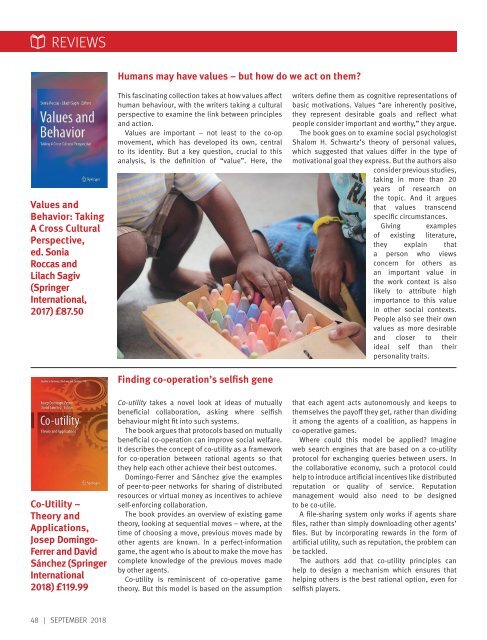SEPTEMBER 2018
The September edition of Co-op News looks at how co-ops cab maintain co-operative values and principles while operating in competitive markets and how this can be a challenge for large co-ops. We examine current research into what influences a co-op’s take on the traditional values of self-help, self-responsibility, democracy, equality, equity and solidarity.
The September edition of Co-op News looks at how co-ops cab maintain co-operative values and principles while operating in competitive markets and how this can be a challenge for large co-ops. We examine current research into what influences a co-op’s take on the traditional values of self-help, self-responsibility, democracy, equality, equity and solidarity.
Create successful ePaper yourself
Turn your PDF publications into a flip-book with our unique Google optimized e-Paper software.
REVIEWS<br />
Humans may have values – but how do we act on them?<br />
Values and<br />
Behavior: Taking<br />
A Cross Cultural<br />
Perspective,<br />
ed. Sonia<br />
Roccas and<br />
Lilach Sagiv<br />
(Springer<br />
International,<br />
2017) £87.50<br />
This fascinating collection takes at how values affect<br />
human behaviour, with the writers taking a cultural<br />
perspective to examine the link between principles<br />
and action.<br />
Values are important – not least to the co-op<br />
movement, which has developed its own, central<br />
to its identity. But a key question, crucial to this<br />
analysis, is the definition of “value”. Here, the<br />
writers define them as cognitive representations of<br />
basic motivations. Values “are inherently positive,<br />
they represent desirable goals and reflect what<br />
people consider important and worthy,” they argue.<br />
The book goes on to examine social psychologist<br />
Shalom H. Schwartz’s theory of personal values,<br />
which suggested that values differ in the type of<br />
motivational goal they express. But the authors also<br />
consider previous studies,<br />
taking in more than 20<br />
years of research on<br />
the topic. And it argues<br />
that values transcend<br />
specific circumstances.<br />
Giving examples<br />
of existing literature,<br />
they explain that<br />
a person who views<br />
concern for others as<br />
an important value in<br />
the work context is also<br />
likely to attribute high<br />
importance to this value<br />
in other social contexts.<br />
People also see their own<br />
values as more desirable<br />
and closer to their<br />
ideal self than their<br />
personality traits.<br />
Co-Utility –<br />
Theory and<br />
Applications,<br />
Josep Domingo-<br />
Ferrer and David<br />
Sánchez (Springer<br />
International<br />
<strong>2018</strong>) £119.99<br />
Finding co-operation’s selfish gene<br />
Co-utility takes a novel look at ideas of mutually<br />
beneficial collaboration, asking where selfish<br />
behaviour might fit into such systems.<br />
The book argues that protocols based on mutually<br />
beneficial co-operation can improve social welfare.<br />
It describes the concept of co-utility as a framework<br />
for co-operation between rational agents so that<br />
they help each other achieve their best outcomes.<br />
Domingo-Ferrer and Sánchez give the examples<br />
of peer-to-peer networks for sharing of distributed<br />
resources or virtual money as incentives to achieve<br />
self-enforcing collaboration.<br />
The book provides an overview of existing game<br />
theory, looking at sequential moves – where, at the<br />
time of choosing a move, previous moves made by<br />
other agents are known. In a perfect-information<br />
game, the agent who is about to make the move has<br />
complete knowledge of the previous moves made<br />
by other agents.<br />
Co-utility is reminiscent of co-operative game<br />
theory. But this model is based on the assumption<br />
that each agent acts autonomously and keeps to<br />
themselves the payoff they get, rather than dividing<br />
it among the agents of a coalition, as happens in<br />
co-operative games.<br />
Where could this model be applied? Imagine<br />
web search engines that are based on a co-utility<br />
protocol for exchanging queries between users. In<br />
the collaborative economy, such a protocol could<br />
help to introduce artificial incentives like distributed<br />
reputation or quality of service. Reputation<br />
management would also need to be designed<br />
to be co-utile.<br />
A file-sharing system only works if agents share<br />
files, rather than simply downloading other agents’<br />
files. But by incorporating rewards in the form of<br />
artificial utility, such as reputation, the problem can<br />
be tackled.<br />
The authors add that co-utility principles can<br />
help to design a mechanism which ensures that<br />
helping others is the best rational option, even for<br />
selfish players.<br />
48 | <strong>SEPTEMBER</strong> <strong>2018</strong>


















